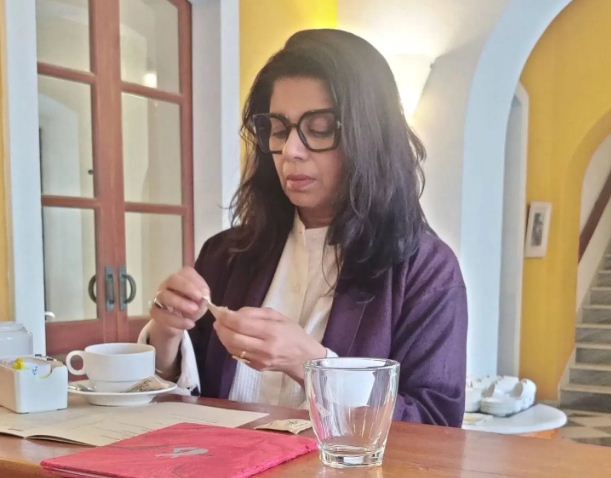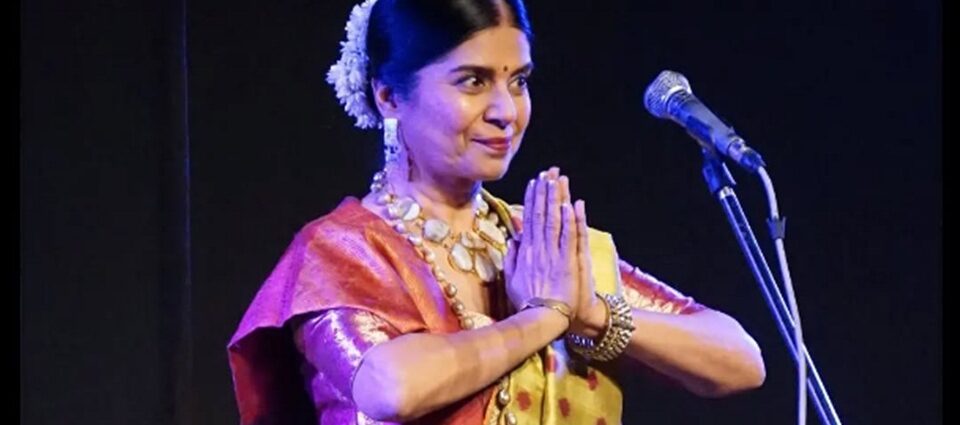Heena Mehta
A force to be reckoned with in Indian theatre, cinema, and television, Mita Vashisht is an artist who defies conventions and breathes life into every role she portrays. Be it Swabhiman’s Devika or Criminal Justice’s Mandira Mathur, Vashisht has played a variety of roles in a career spanning decades and has seamlessly transitioned between stage and screen, leaving an indelible mark with her powerful performances and nuanced storytelling.
A homecoming to NSD
Meeting Mita ji at the National School of Drama (NSD) premises was a moment of nostalgia. When I asked how it felt to return as a guest to the very institution that once shaped her journey, she smiled and reflected, “I am still deeply connected to NSD. Over the years, I have gathered my own share of experiences—teaching students, interacting with young theatre minds—each moment leaving a mark. Everyone and everything here holds a special place in my heart.”

Theatre’s timeless appeal in a digital world
Despite the growing dominance of digital entertainment, Mita Vashisht firmly believes in the enduring appeal of theatre. “I don’t think there’s been a shift in the attitude of theatre-goers. If the play is good, they will always show up. In fact, theatre might become even more significant as people grow weary of their virtual lives and phones.”
Redefining the norm: Work that stands apart
Does she see her work as bringing tangible societal change? The actor clarifies that while she does not claim to have changed the world, she prioritizes honesty in her craft. “Being authentic in one’s work naturally creates space in the industry. I am not on a mission to change the world—that kind of transformation is a result of collective consciousness, not an individual effort.”
The evolution of Hindi cinema – imitation or lost identity?
On the subject of Bollywood’s evolution, Mita Vashisht holds strong views. “Mainstream Hindi cinema has undergone a drastic transformation since the 1950s, increasingly imitating Hollywood and straying far from India’s rich storytelling traditions.”

The actor’s view on a director’s play adaptation
Having worked with some of the finest directors in the country, Mita ji respects those who choose to adapt plays. However, she firmly states that she would never attempt to adapt Anton Chekhov’s works. “His work is so profound and timeless that it resonates best in its original form, particularly through its translation.”
Chekhov’s influence: The unspoken in performance
Chekhov’s writing is layered with unspoken emotions and subtle complexities. As an actor celebrated for portraying deep, intricate characters, how does she bring forth what remains unsaid on stage or screen? Mita Vashisht, acclaimed for her theatrical portrayal of Lal Ded, explains, “The body is a dynamic landscape where breath, movement, and emotion intertwine. True artistry lies in mastering this connection—allowing an actor to evoke the unspoken with authenticity, depth, and grace.”
Directing ‘The Three Sisters’: Inner transformation over audience approval
When directing NSD’s third-year students in The Three Sisters by Anton Chekhov, Mita Vashisht recalled the students’ skepticism about the play’s three-and-a-half-hour duration. Would an audience stay engaged? She confidently responded, “Those who want to come will come, and they will stay.” She emphasizes that theatre isn’t just about capturing the audience’s attention. “First, consider the changes and transformation within yourself—what awareness has developed in you? That’s what matters more. When you instill this within your students, the audience will feel it too.”
Theatre toh diwane karte hain
Reflecting on Ratna Pathak Shah’s statement, “Theatre toh diwane karte hain,” Mita ji nodded in agreement. When I pointed out how audiences are willing to sit through a three-and-a-half-hour film but hesitate to commit the same time to a play, her response was telling. Her words captured the passion and dedication required to keep theatre alive—an art form that thrives on the madness and devotion of its practitioners.
Reinventing herself on stage: The power of theatre
Seamlessly transitioning across theatre, films, and television, how does she see the difference between these mediums? “All three are fulfilling, but theatre offers me the space and freedom to constantly reinvent myself and evolve.”

Sustaining theatre: The need for continuous nurturing
Actor Rajpal Yadav, an NSD alumnus, was named the brand ambassador for Bharat Rang Mahotsav. During the festival, he made an earnest appeal for increased grants to NSD. When asked about this, Mita ji firmly stated that funding is essential.
“Theatre is like a fruit-bearing tree; it needs constant care and nourishment. If tended well, it will continue to bear fruit. Theatre is deeply connected to the soul. Stage funding is not about counting the fruits it yields but about nurturing the entire orchard, ensuring its longevity and artistic growth.”
Timeless reassurance – Anton Chekhov’s enduring influence
Has Chekhov’s work shaped her as a performer across TV, theatre, and film? She shares, “Chekhov’s writings offer immense reassurance. If, 125 years ago, he was exploring questions about one’s relevance in a changing world, and we are still asking them today, then it’s completely natural. Engaging with his work makes me feel deeply assured and connected.”
The journey ahead – passion, art, and the road forward
When asked about what motivates her as a person and an artist, Mita ji simply states, “The path I have chosen.” As for what lies ahead, she reveals, “It has been 21 years of Lal Ded, and I have many shows lined up this year. There’s a lot more to come!”

